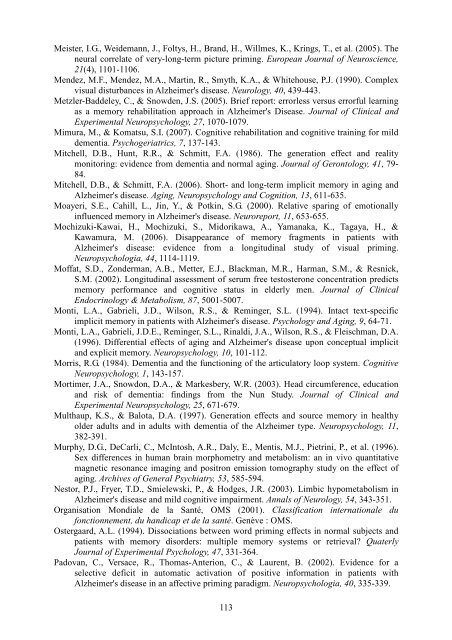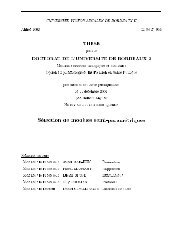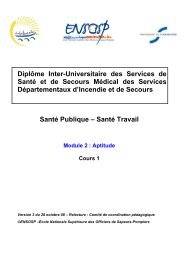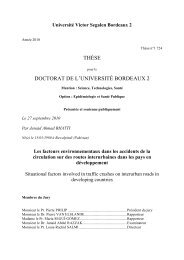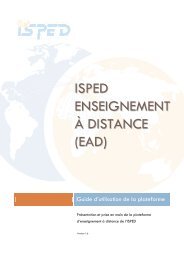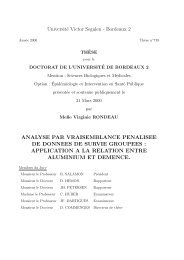Meister, I.G., Weidemann, J., Foltys, H., Brand, H., Willmes, K., Krings, T., et al. (2005). Theneural correlate of very-long-term picture priming. European Journal of Neuroscience,21(4), 1101-1106.Mendez, M.F., Mendez, M.A., Martin, R., Smyth, K.A., & Whitehouse, P.J. (1990). Comp<strong>le</strong>xvisual disturbances in Alzheimer's disease. Neurology, 40, 439-443.Metz<strong>le</strong>r-Badde<strong>le</strong>y, C., & Snowden, J.S. (2005). Brief report: error<strong>le</strong>ss versus errorful <strong>le</strong>arningas a memory rehabilitation approach in Alzheimer's Disease. Journal of Clinical andExperimental Neuropsychology, 27, 1070-1079.Mimura, M., & Komatsu, S.I. (2007). Cognitive rehabilitation and cognitive training for milddementia. Psychogeriatrics, 7, 137-143.Mitchell, D.B., Hunt, R.R., & Schmitt, F.A. (1986). The generation effect and realitymonitoring: evidence from dementia and normal aging. Journal of Gerontology, 41, 79-84.Mitchell, D.B., & Schmitt, F.A. (2006). Short- and long-term implicit memory in aging andAlzheimer's disease. Aging, Neuropsychology and Cognition, 13, 611-635.Moayeri, S.E., Cahill, L., Jin, Y., & Potkin, S.G. (2000). Relative sparing of emotionallyinfluenced memory in Alzheimer's disease. Neuroreport, 11, 653-655.Mochizuki-Kawai, H., Mochizuki, S., Midorikawa, A., Yamanaka, K., Tagaya, H., &Kawamura, M. (2006). Disappearance of memory fragments in patients withAlzheimer's disease: evidence from a longitudinal study of visual priming.Neuropsychologia, 44, 1114-1119.Moffat, S.D., Zonderman, A.B., Metter, E.J., Blackman, M.R., Harman, S.M., & Resnick,S.M. (2002). Longitudinal assessment of serum free testosterone concentration predictsmemory performance and cognitive status in elderly men. Journal of ClinicalEndocrinology & Metabolism, 87, 5001-5007.Monti, L.A., Gabrieli, J.D., Wilson, R.S., & Reminger, S.L. (1994). Intact text-specificimplicit memory in patients with Alzheimer's disease. Psychology and Aging, 9, 64-71.Monti, L.A., Gabrieli, J.D.E., Reminger, S.L., Rinaldi, J.A., Wilson, R.S., & F<strong>le</strong>ischman, D.A.(1996). Differential effects of aging and Alzheimer's disease upon conceptual implicitand explicit memory. Neuropsychology, 10, 101-112.Morris, R.G. (1984). Dementia and the functioning of the articulatory loop system. CognitiveNeuropsychology, 1, 143-157.Mortimer, J.A., Snowdon, D.A., & Markesbery, W.R. (2003). Head circumference, educationand risk of dementia: findings from the Nun Study. Journal of Clinical andExperimental Neuropsychology, 25, 671-679.Multhaup, K.S., & Balota, D.A. (1997). Generation effects and source memory in healthyolder adults and in adults with dementia of the Alzheimer type. Neuropsychology, 11,382-391.Murphy, D.G., DeCarli, C., McIntosh, A.R., Daly, E., Mentis, M.J., Pietrini, P., et al. (1996).Sex differences in human brain morphometry and metabolism: an in vivo quantitativemagnetic resonance imaging and positron emission tomography study on the effect ofaging. Archives of General Psychiatry, 53, 585-594.Nestor, P.J., Fryer, T.D., Smie<strong>le</strong>wski, P., & Hodges, J.R. (2003). Limbic hypometabolism inAlzheimer's disease and mild cognitive impairment. Annals of Neurology, 54, 343-351.Organisation Mondia<strong>le</strong> de la Santé, OMS (2001). Classification internationa<strong>le</strong> dufonctionnement, du handicap et de la santé. Genève : OMS.Ostergaard, A.L. (1994). Dissociations between word priming effects in normal subjects andpatients with memory disorders: multip<strong>le</strong> memory systems or retrieval? QuaterlyJournal of Experimental Psychology, 47, 331-364.Padovan, C., Versace, R., Thomas-Anterion, C., & Laurent, B. (2002). Evidence for ase<strong>le</strong>ctive deficit in automatic activation of positive information in patients withAlzheimer's disease in an affective priming paradigm. Neuropsychologia, 40, 335-339.113
Patterson, K., Graham, N., & Hodges, J.R. (1994). Reading in Dementia of the AlzheimerType: A Preserved Ability? Neuropsychology, 8, 395-407Perri, R., Car<strong>le</strong>simo, G.A., Serra, L., & Caltagirone, C. (2005). Characterization of memoryprofi<strong>le</strong> in subjects with amnestic mild cognitive impairment. Journal of Clinical andExperimental Neuropsychology, 27, 1033-1055.Perry, R.J., & Hodges, J.R. (1999). Attention and executive deficits in Alzheimer's disease. Acritical review. Brain, 122, 383-404.Perry, R.J., Watson, P., & Hodges, J.R. (2000). The nature and staging of attention dysfunctionin early (minimal and mild) Alzheimer's disease: relationship to episodic and semanticmemory impairment. Neuropsychologia, 38, 252-271.Petersen, R.C., Smith, G.E., Ivnik, R.J., Kokmen, E., & Tangalos, E.G. (1994). Memoryfunction in very early Alzheimer's disease. Neurology, 44, 867-872.Pillon, B., Deweer, B., Agid, Y., & Dubois, B. (1993). Explicit memory in Alzheimer's,Huntington's, and Parkinson's diseases. Archives of Neurology, 50, 374-379.Piolino, P., Desgranges, B., Belliard, S., Matuszewski, V., La<strong>le</strong>vee, C., De la Sayette, V., et al.(2003). Autobiographical memory and autonoetic consciousness: trip<strong>le</strong> dissociation inneurodegenerative diseases. Brain, 126, 2203-2219.Poe, M.K., & Seifert, L.S. (1997). Implicit and explicit tests: evidence for dissociab<strong>le</strong> motorskills in probab<strong>le</strong> Alzheimer's dementia. Perceptual & Motor Skills, 85, 631-634.Proust-Lima, C., Amieva, H., Letenneur, L., Orgogozo, J.M., Jacqmin-Gadda, H., &Dartigues, J.F. (2008). Gender and education impact on brain aging: a general cognitivefactor approach. Psychology and Aging, 23, 608-620.Quoniam, N., Ergis, A.M., Fossati, P., Peretz, I., Samson, S., Sarazin, M., et al. (2003).Implicit and explicit emotional memory for melodies in Alzheimer's disease anddepression. Annals of the New York Academy of Sciences, 999, 381-384.Raich<strong>le</strong>, M.E., Fiez, J.A., Videen, T.O., MacLeod, A.M., Pardo, J.V., Fox, P.T., et al. (1994).Practice-related changes in human brain functional anatomy during nonmotor <strong>le</strong>arning.Cerebral Cortex, 4, 8-26.Rainvil<strong>le</strong>, C., Amieva, H., Lafont, S., Dartigues, J.F., Orgogozo, J.M., & Fabrigou<strong>le</strong>, C.(2002). Executive function deficits in patients with dementia of the Alzheimer's type: astudy with a Tower of London task. Archives of Clinical Neuropsychology, 17, 513-530.Rapcsak, S.Z., Croswell, S.C., & Rubens, A.B. (1989). Apraxia in Alzheimer's disease.Neurology, 39, 664-668.Rasmusson, D.X., Carson, K.A., Brookmeyer, R., Kawas, C., & Brandt, J. (1996). Predictingrate of cognitive decline in probab<strong>le</strong> Alzheimer's disease. Brain and Cognition, 31, 133-147.Ri<strong>le</strong>y, G.A., Sotiriou, D., & Jaspal, S. (2004). Which is more effective in promoting implicitand explicit memory: The method of vanishing cues or error<strong>le</strong>ss <strong>le</strong>arning withoutfading? . Neuropsychological Rehabilitation, 14, 257-283.Roediger, H.L., 3rd, & Blaxton, T.A. (1987). Effects of varying modality, surface features,and retention interval on priming in word-fragment comp<strong>le</strong>tion. Memory and Cognition,15(5), 379-388.Roediger, H.L., III, Weldon, M.S., & Challis, B.H. (1989). Explaining dissociations betweenimplicit and explicit measures of retention: A processing account. In H.L. Roediger &F.I.M. Craik (Eds.), Varieties of memory and consciousness: Essays in honour of EndelTulving (pp. 3-41). Hillsda<strong>le</strong>: Erlbaum.Roudier, M., Marcie, P., Grancher, A.S., Tzortzis, C., Starkstein, S., & Bol<strong>le</strong>r, F. (1998).Discrimination of facial identity and of emotions in Alzheimer's disease. Journal ofNeurological Sciences, 154, 151-158.Rou<strong>le</strong>au, I., Salmon, D.P., & Vrbancic, M. (2002). Learning, retention and generalization of amirror tracing skill in Alzheimer's disease. Journal of Clinical and ExperimentalNeuropsychology, 24, 239-250.114
- Page 1 and 2:
Université Bordeaux 2 - Victor Seg
- Page 3 and 4:
ABSTRACTResidual cognitive abilitie
- Page 5 and 6:
visites sur site (souviens toi la S
- Page 7 and 8:
« Dans le parc du château, il y a
- Page 9 and 10:
CHAPITRE II : PARTIE EXPERIMENTALE.
- Page 11 and 12:
CHAPITRE I : INTRODUCTION THEORIQUE
- Page 13 and 14:
La mort sociale est une figure réc
- Page 15 and 16:
améliorer ce rappel lorsqu’une a
- Page 17 and 18:
traiter une information pertinente
- Page 19 and 20:
exécutives soient manifestes (Hodg
- Page 21 and 22:
« représentationnel » de mémoir
- Page 23 and 24:
3.2.1. Capacités d'amorçageLe ph
- Page 27 and 28:
que les patients pré-diagnostiqué
- Page 30 and 31:
traitements dirigés par les concep
- Page 32 and 33:
complexes aux différents évèneme
- Page 34 and 35:
Enfin, la capacité des patients MA
- Page 36 and 37:
4.2.2. Facteurs favorisant la const
- Page 38 and 39:
et al., 2007 ; Wilson et al., 2000)
- Page 40 and 41:
la maladie. En effet, dans cette é
- Page 42 and 43:
dix minutes. D’autres études sug
- Page 44 and 45:
JOURNAL OF CLINICAL AND EXPERIMENTA
- Page 46 and 47:
Downloaded By: [EBSCOHost EJS Conte
- Page 48 and 49:
Downloaded By: [EBSCOHost EJS Conte
- Page 50 and 51:
834 MILLET ET AL.Downloaded By: [EB
- Page 52 and 53:
2. Influence des niveaux de traitem
- Page 54 and 55:
l’effet d’amorçage estimé che
- Page 56 and 57:
2 MILLET ET AL.Downloaded By: [Mill
- Page 58 and 59:
4 MILLET ET AL.Downloaded By: [Mill
- Page 60 and 61:
6 MILLET ET AL.Downloaded By: [Mill
- Page 62 and 63:
8 MILLET ET AL.Downloaded By: [Mill
- Page 64 and 65: 10 MILLET ET AL.Downloaded By: [Mil
- Page 66 and 67: 3. Influence du sexe sur les perfor
- Page 68 and 69: dans les tâches de manipulation ac
- Page 70 and 71: 784 X. Millet et al. / Archives of
- Page 73 and 74: Verbal short-term memory measuresWe
- Page 75 and 76: X. Millet et al. / Archives of Clin
- Page 77 and 78: des patients MA évalués dans une
- Page 79 and 80: l'évaluation du caractère plaisan
- Page 81 and 82: de la phase de test, les opération
- Page 83 and 84: l’activité du cortex frontal non
- Page 85 and 86: stratégies visuo-spatiales de natu
- Page 87 and 88: fonctionnement quotidien des patien
- Page 89 and 90: 4.3. Méthodes de revalidation cogn
- Page 91 and 92: communes à ces différents program
- Page 93 and 94: phase d’apprentissage. Toutefois,
- Page 95 and 96: des photographies de visages et des
- Page 97 and 98: Ainsi, à partir de janvier 2010, c
- Page 99 and 100: souvent été rapportés à partir
- Page 101 and 102: 5. Conclusion généraleCompte tenu
- Page 103 and 104: BIBLIOGRAPHIE102
- Page 105 and 106: York: Cambridge University Press.Ba
- Page 107 and 108: Multidimensional measures of person
- Page 109 and 110: Fox, N.C., Warrington, E.K., Freebo
- Page 111 and 112: Procedural memory in patients with
- Page 113: 625-632). London: Academic Press.La
- Page 117 and 118: test: role of aging and divided att
- Page 119 and 120: ANNEXES118
- Page 121 and 122: • Photographies des visages distr
- Page 123 and 124: Epreuve de titresCe travail de thè


